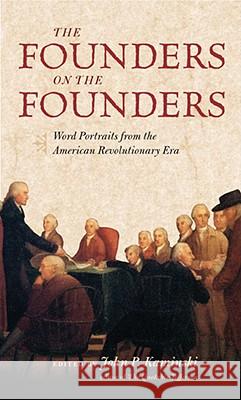The Founders on the Founders: Word Portraits from the American Revolutionary Era » książka
The Founders on the Founders: Word Portraits from the American Revolutionary Era
ISBN-13: 9780813927572 / Angielski / Twarda / 2008 / 624 str.
-I never indeed thought him an honest, frank-dealing man, but considered him as a crooked gun, or other perverted machine, whose aim or stroke you could never be sure of.---Thomas Jefferson on Aaron Burr- A]lways an honest Man, often a wise one, but sometimes, and in some things, absolutely out of his senses.--- Benjamin Franklin on John Adams-I do now know Jefferson] to be one of the most artful, intriguing, industrious and double-faced politicians in all America.--- John Nicholas to George Washington-I shall really regret to leave Mr. Jefferson, he is one of the choice ones of the Earth.--- Abigail AdamsMore than two centuries after the ground-breaking events of the American struggle for independence, its key figures strike us more as players in a myth than as people who lived, worked, and interacted with one another. To recover the human dimension of the founders, we need look no further than their own words. Through a series of revealing quotations, historian John P. Kaminski profiles thirty of the era's best-known individuals, including Benjamin Franklin, John Jay, Alexander Hamilton, John Hancock, Thomas Paine, and Patrick Henry (-all tongue without either head or heart, - according to Thomas Jefferson), as well as the early presidents and their first ladies.The discourse is unfailingly respectful, and yet this is no mutual admiration society. The subjects are not afraid to be sharp about one another, but this only makes their words of praise more convincing and poignant. One could hardly ask for a more clear-eyed, and touching, tribute than Thomas Jefferson's appraisal of George Washington: -He was incapable of fear, meeting personal dangers with the calmest unconcern.... His integrity was most pure, his justice the most inflexible I have ever known, no motives of interest or consanguinity, of friendship or hatred, being able to bias his decision. He was, indeed, in every sense of the words, a wise, a good, and a great man.-Beginning with an introductory essay that provides an overview of the relationships between the founders, the book then presents each individual, providing a biographical sketch and a chronologically arranged series of quotations, clarifying not only each person's place within the independence movement but the contours of their character. The authors strike us with their candor, their insight, and their eloquence as they make their subjects come alive for us. As this book reveals, greatness is not only a matter of responding to the times; the people themselves were remarkable.











